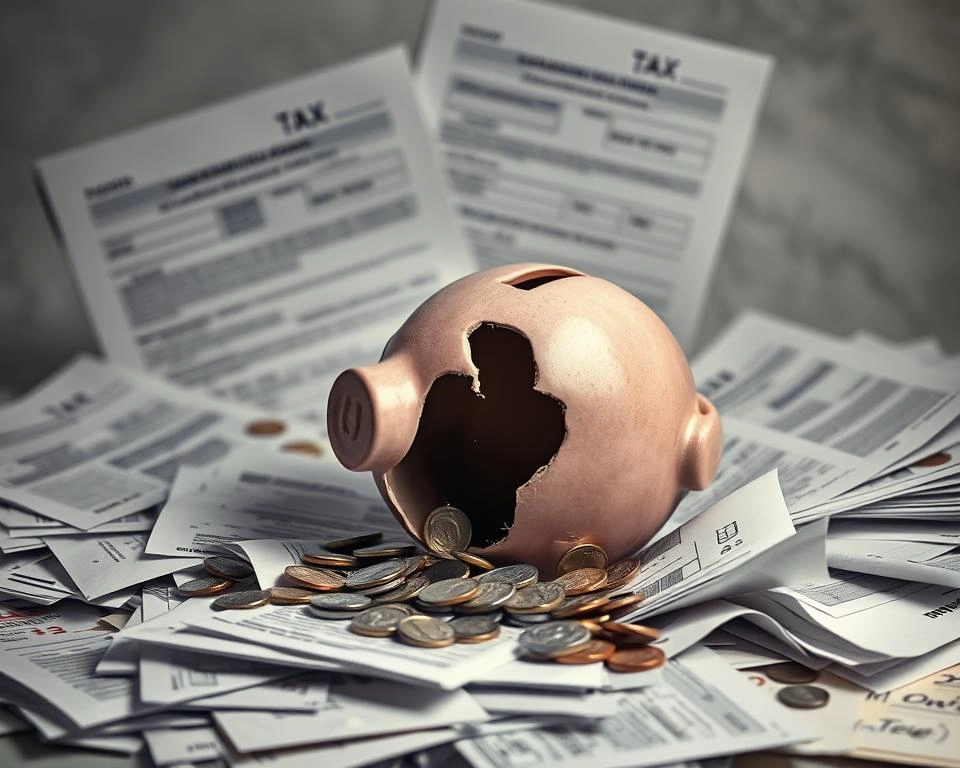Did you know over 7 million Americans filed for bankruptcy in 2022? This is a 96% increase from the year before. Understanding the tax rules after bankruptcy is key for both individuals and businesses. It involves filing tax returns and managing tax debts, all under the Bankruptcy Code’s rules.
Introduction to Tax Implications After Bankruptcy
Bankruptcy is a complex legal process that can affect your taxes. It’s important to know how it impacts your tax situation. This section will cover the main tax issues you’ll face when filing for bankruptcy.
The bankruptcy estate is key in figuring out your tax duties. You and your business must follow certain tax filing rules. You also need to understand how income, deductions, and credits are split between you and the estate. Not dealing with these tax issues can cause more financial problems and penalties.
To smoothly handle tax issues after bankruptcy, work with tax experts and financial advisors. They can help you through the legal and financial challenges. By knowing your tax duties and strategies, you can better manage the bankruptcy process. This way, you can make the most of a “fresh start.”

“Bankruptcy is a powerful tool, but it’s not a one-size-fits-all solution. Understanding the tax consequences is critical to making informed decisions and achieving the best possible outcome.”
In the next sections, we’ll explore the tax implications, compliance needs, and strategies for dealing with tax challenges during and after bankruptcy.
Understanding the Bankruptcy Code Tax Compliance Requirements
The Bankruptcy Code has strict rules for tax compliance. Debtors must file all tax returns on time. This includes federal, state, and local taxes due before and after filing.
Not filing tax returns can lead to big problems. It might turn your bankruptcy case into a different type or even dismiss it. So, it’s key to follow the Bankruptcy Code’s tax rules.
Tax Returns Due for Periods Ending Before and After the Bankruptcy Filing
Debtors must be careful with their tax filings. They need to file returns for times before and after filing. Keeping up with these tax return filing requirements is vital for staying in compliance.
“Failure to timely file tax returns or obtain an extension can result in the bankruptcy case being converted or dismissed.”
Handling bankruptcy tax compliance can be tough. But it’s a crucial part of bankruptcy. By following the Bankruptcy Code’s rules, debtors can avoid major issues and make their bankruptcy process smoother.

Tax Implications After Bankruptcy: What to Know
Filing for bankruptcy can change your taxes a lot. One big thing is if you can wipe out tax debts. If you can, it depends on the tax type, how old the debt is, and when you filed for bankruptcy.
Bankruptcy also affects how you handle tax debts and refunds. You might have to pay off tax debts to the government. And you could get tax refunds, which become part of your bankruptcy case. It’s essential to understand these tax matters when going through bankruptcy.
Another thing to think about is how bankruptcy changes your tax attributes. This includes things like net operating losses and credit carryovers. Bankruptcy can reduce or even eliminate these items. Getting help from a tax expert is a beneficial idea to handle these changes well.
“Bankruptcy can have far-reaching tax consequences, and it’s essential for individuals to be aware of these implications to make informed decisions and protect their financial well-being.”
The tax effects of bankruptcy can be tricky. Knowing about tax debt discharge, how taxes and refunds are handled, and changes to tax attributes helps. This way, you can deal with bankruptcy better and avoid tax problems.

Individuals in Chapter 7 or 11 Bankruptcy
People filing for bankruptcy under Chapter 7 or Chapter 11 have to deal with tax filing rules. They can choose to end their tax year when they file for bankruptcy. This might mean they have to file two short tax returns.
Debtor’s Election to End Tax Year and Filing Requirements
Those in Chapter 7 or Chapter 11 bankruptcy can pick when to end their tax year. They can choose the date their Chapter 7 bankruptcy or Chapter 11 bankruptcy petition was filed. This choice can lead to filing two short tax returns.
Taxes and the Bankruptcy Estate
The bankruptcy estate is seen as a separate taxable unit. The trustee in charge of the estate must file a Form 1041 tax return. This return includes details about the estate’s tax year-end election and bankruptcy estate tax filing.
“Navigating the tax implications of bankruptcy can be a complex process, but understanding the key requirements and elections can help individuals and trustees ensure compliance and minimize potential issues.”
By managing the chapter 7 bankruptcy, chapter 11 bankruptcy, tax year end election, and bankruptcy estate tax filing well, debtors and trustees can make tax filing smoother. This is important during and after bankruptcy.

Bankruptcy Estate Income, Deductions, and Credits
When someone or a business files for bankruptcy, a new entity called the bankruptcy estate is formed. This estate has its own bankruptcy estate income, bankruptcy estate deductions, and bankruptcy estate credits. It’s important to understand these to handle the bankruptcy process well.
The estate’s income comes from selling assets, rental income, or interest on its funds. These earnings need to be tracked and reported on the estate’s tax return. The estate can also deduct administrative costs like legal fees and trustee pay.
The estate can use the debtor’s tax benefits, like net operating losses, to reduce its income. This can lower the estate’s taxes, helping both creditors and the debtor.
It’s key to plan and report the estate’s taxes correctly. Not following the Bankruptcy Code’s tax rules can cause penalties and more problems. Knowing the estate’s tax rules helps manage the financial impact of bankruptcy better.
“Careful tax planning is crucial when navigating the bankruptcy process. Maximizing deductions and utilizing available tax credits can make a significant difference in the overall outcome.”
Tax Reporting in Chapter 11 Cases
People filing for chapter 11 bankruptcy face extra tax reporting duties. They must file two tax returns: one for themselves (Form 1040) and another for the bankruptcy estate (Form 1041). Reporting the split of income, credits, and self-employment taxes between them and the estate to the IRS is crucial.
Allocation of Income, Credits, and Self-Employment Taxes
Income, credits, and self-employment taxes need to be divided between the person and the estate. This division is key for correct tax reporting and following the law. Depending on the details of the case, either the person or the estate can claim some deductions and credits.
To get tax reporting right, those in chapter 11 bankruptcy should team up with tax experts. They need to document how income and self-employment taxes are split between the person and the estate accurately.
“Proper tax reporting is essential for individuals in chapter 11 bankruptcy to avoid potential issues with the IRS.”
Knowing the special tax reporting rules for chapter 11 bankruptcy helps people deal with the process better. It also lowers the chance of tax problems.

Bankruptcy Estate Tax Return Filing and Payment
Filing for bankruptcy creates a new tax entity known as the bankruptcy estate. This estate must file its own tax return and pay any taxes it owes. The steps for bankruptcy estate tax filing and bankruptcy estate tax payment are complex but very important.
Filing Requirements and Payment Methods
The bankruptcy estate needs to file a separate tax return, usually using Form 1041. This form is due by the 15th day of the 4th month after the estate’s fiscal year ends. The estate might also need to make estimated tax payments during the year to avoid penalties.
The estate can pay taxes in several ways, like electronic funds transfer, check, or money order. It’s crucial to ensure that all payments are made on time and accurately to prevent any additional fees.
Employment Taxes and Estimated Taxes
The bankruptcy estate also handles employment taxes for its employees. This includes withholding and paying payroll taxes, as well as the employer’s share of Social Security and Medicare taxes.
The estate might need to make estimated tax payments throughout the year to cover its tax liability. This helps avoid penalties and keeps the estate in line with the Bankruptcy Code.
“Properly managing the bankruptcy estate’s tax obligations is crucial for ensuring a smooth and successful bankruptcy process.”
Partnerships, Corporations, and Tax-Free Reorganizations
Bankruptcy can have special tax rules for partnerships and corporations. They must deal with filing tax returns, sharing income and credits, and possibly tax-free reorganizations. Getting professional tax advice is key for businesses in bankruptcy.
Partnerships in bankruptcy face complex tax issues. The partnership might file tax returns, and partners must report their share of income and credits on their personal returns. It’s important to plan carefully to follow tax laws.
Corporations in bankruptcy also have to manage their taxes carefully. This includes handling tax effects of asset sales, debt changes, and tax-free reorganizations. It’s a challenging process, and they should consult with tax experts to make informed decisions.
Tax-free reorganizations can help businesses in bankruptcy. They allow for restructuring without immediate tax costs. But the rules are strict, and following them is crucial. Getting expert help is vital for success.
“Navigating the tax implications of bankruptcy is a critical component of any successful restructuring strategy. Collaborating with proficient experts can significantly enhance a business’s sustainability and reduce its financial strain.
Businesses in bankruptcy must tackle unique tax challenges. Knowing the rules and getting professional help is crucial. This way, partnerships, corporations, and those doing tax-free reorganizations can protect their interests and come out of bankruptcy financially strong.

Federal Tax Claims and Discharge of Unpaid Tax
Bankruptcy can greatly affect how we handle federal tax claims and unpaid taxes. The Bankruptcy Code has rules for tax claims and how to pay them off. It also talks about when you can get rid of tax debts. This part will dive into the details of federal tax claims and how to get rid of unpaid taxes in bankruptcy.
Debt Cancellation and Reduction of Tax Attributes
The cancellation of debt is a crucial aspect of bankruptcy. This can change the debtor’s tax attributes. Tax attributes include items such as net operating losses and carryovers, which can aid in future tax calculations. Upon debt cancellation, the debtor may need to reduce these tax attributes, a process known as tax attribute reduction.
Debt cancellation and tax attribute reduction can significantly impact the debtor’s taxes. It’s important to know these rules well, especially if you’re going through bankruptcy.
- The Bankruptcy Code has specific rules for federal tax claims and discharge of tax debts.
- Canceling debt in bankruptcy can lower the debtor’s tax attributes, like net operating losses and carryovers.
- The tax attribute reduction process stops the debtor from getting too much benefit from the canceled debt.
“Navigating the complex rules surrounding federal tax claims and the discharge of unpaid taxes in bankruptcy can be a daunting task, but understanding these nuances is crucial for achieving the best possible outcome.”
Knowing the tax side of bankruptcy can help people and businesses get ready for the financial ups and downs. Getting advice from tax and legal experts is key to making it through this tough time successfully.

Filing for bankruptcy can lead to big tax issues that need careful handling. Debtors need to understand the regulations regarding tax filing, tax debts, and the treatment of taxes during bankruptcy. Getting expert tax advice is key to following the Bankruptcy Code’s tax rules and getting the best financial results from bankruptcy.
The tax effects of bankruptcy aren’t just for individuals. They also affect the bankruptcy estate, partnerships, corporations, and tax-free reorganizations. It’s important to plan well and pay close attention to details to lessen the tax load and use any tax breaks or debt forgiveness options.
Knowing the tax impacts of bankruptcy helps debtors make smart choices, meet their tax duties, and aim for a strong financial comeback. With the right advice and plans, navigating bankruptcy can be smoother. This aids in preventing tax issues and paves the way for a more prosperous financial future.
30 Tips On Tax Implications After Bankruptcy
- Understand Dischargeable Taxes: Not all tax debts are dischargeable in bankruptcy. Generally, income taxes may be discharged if they meet specific criteria, while other taxes like payroll or fraud penalties are typically non-dischargeable. The Tax Adviser
- Meet the Three-Year Rule: For income tax debts to be dischargeable, the tax return must have been due at least three years before filing for bankruptcy. The Tax Adviser
- Comply with the Two-Year Filing Requirement: The tax return must have been filed at least two years before the bankruptcy filing to qualify for discharge. The Tax Adviser
- Adhere to the 240-Day Assessment Rule: The tax must have been assessed by the IRS at least 240 days before filing for bankruptcy. The Tax Adviser
- Avoid Fraud and Willful Evasion: Taxes are non-dischargeable if the taxpayer filed fraudulent returns or willfully attempted to evade taxes. The Tax Adviser
- File All Required Tax Returns: The Bankruptcy Code mandates that debtors file all required tax returns for tax periods ending within four years of the bankruptcy filing. IRS
- Understand the Automatic Stay: Filing for bankruptcy triggers an automatic stay, temporarily halting IRS collection activities, including wage garnishments and levies. IRS
- Know the Role of the Bankruptcy Estate: In Chapter 7 and 11 cases, a separate taxable entity called the bankruptcy estate is created, which may have its own tax filing requirements. IRS
- Be Aware of Trustee Responsibilities: In Chapter 7 cases, the trustee is responsible for filing the estate’s tax returns. In Chapter 11 cases, the debtor-in-possession typically handles this duty. IRS
- Consider the Short Tax Year Election: Debtors can elect to close their tax year the day before filing for bankruptcy, resulting in two short tax years, which may have strategic tax benefits. IRS
- Report All Income Accurately: Ensure that all income, including any received after filing for bankruptcy, is reported correctly on tax returns. IRS
- Understand Debt Cancellation Income: Debt discharged in bankruptcy is generally excluded from gross income, but it may lead to a reduction in tax attributes. IRS
- Reduce Tax Attributes When Required: Excluding canceled debt from income may require reducing tax attributes like net operating losses and credit carryovers. IRS
- Maintain Detailed Records: Keep comprehensive records of all debts discharged and any correspondence with tax authorities during bankruptcy proceedings. IRS
- Consult a Tax Professional: Given the complexity of tax laws in bankruptcy, seeking advice from a tax professional experienced in this area is highly recommended. IRS
- Stay Informed About State Tax Laws: State tax obligations may differ from federal ones; ensure compliance with both sets of laws. IRS
- Monitor Tax Refunds: Tax refunds owed at the time of filing may become part of the bankruptcy estate and be used to pay creditors. IRS
- Be Cautious with New Debt: Avoid incurring new tax debts during bankruptcy proceedings, as they may not be dischargeable. IRS
- Understand Post-Bankruptcy Tax Obligations: After bankruptcy, you are responsible for all new tax obligations; failure to comply can lead to serious consequences. IRS
- Review IRS Publications: IRS Publication 908 provides detailed information on tax aspects of bankruptcy. IRS
- Address Non-Dischargeable Taxes: Develop a plan to pay any taxes that are not dischargeable to avoid future penalties and interest. IRS
- Communicate with the IRS: If you have questions or need clarification on tax matters during bankruptcy, contact the IRS’s Centralized Insolvency Operation. IRS
- Be Aware of Collection Activities Post-Bankruptcy: Understand when and how the IRS can resume collection activities after the automatic stay is lifted. IRS
- Know the Impact on Tax Credits: Bankruptcy can affect eligibility for certain tax credits; consult a tax advisor to understand your specific situation. The Tax Adviser
- Plan for Future Tax Payments: Establish a budget that includes timely payment of future tax obligations to prevent accumulation of new tax debts. IRS
- Understand the Impact on Tax Attributes: Excluding canceled debt from income may require reducing tax attributes like net operating losses and credit carryovers. Wikipedia
- Seek Legal Counsel When Necessary: For complex cases, consulting with a bankruptcy attorney can provide clarity on both legal and tax implications. IRS
- Stay Updated on Tax Laws: Tax laws can change; staying informed will help you remain compliant and make informed decisions.
Key Takeaways
- Bankruptcy can have significant tax implications, including the need to file tax returns, manage tax liabilities, and navigate complex rules around tax attributes.
- Debtors in bankruptcy must comply with the Bankruptcy Code’s tax compliance requirements, such as filing individual tax returns or requesting extensions.
- Bankruptcy trustees are responsible for filing tax returns for the bankruptcy estate, and failure to do so can result in the case being converted or dismissed.
- Taxpayers in bankruptcy must carefully consider the tax implications of their situation, including the potential discharge of tax debt and the reduction of tax attributes.
- Seeking professional tax advice is crucial for navigating the tax implications of bankruptcy and ensuring compliance with all applicable laws and regulations.
Source Links
- Filing Taxes After Filing for Bankruptcy – https://turbotax.intuit.com/tax-tips/debt/filing-taxes-after-filing-for-bankruptcy/L4PpcTaiW
- Publication 908 (02/2024), Bankruptcy Tax Guide – https://www.irs.gov/publications/p908
- Tax Consequences of Bankruptcy – https://www.bankruptcyinbrief.com/codincome/



